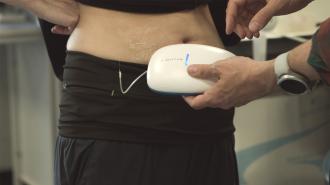A new wearable device allowed researchers to discover how human stress hormones ebb and flow in healthy people, providing a baseline that could help identify people with abnormal hormone rhythms in the future.
The background: Hormones are chemicals released by glands throughout your body, and they’re vitally important to your health, affecting metabolism, reproduction, mood, and more.
Researchers have identified more than 50 hormones, and some of them are known to operate on cycles — your glands start to secrete more of the hormone melatonin, for example, when it gets dark outside to help you sleep.
Identifying healthy hormone rhythms has been difficult for researchers.
Disturbances in the rhythms of your hormones can cause health issues. Because darkness comes earlier in the winter, some people’s bodies will start ramping up melatonin production well before bedtime — and this may lead to seasonal affective disorder (SAD).
Conversely, production of cortisol — a hormone closely linked to stress — typically peaks around 9 a.m. and hits its lowest point around midnight, suggesting it plays a role in feelings of wakefulness. People experiencing a lot of stress can have higher than normal levels later in the day, which has been linked to insomnia.
The challenge: Identifying healthy hormone rhythms has been difficult for researchers — currently, their only option is to have people stay in a hospital or clinic overnight so that their blood can be drawn repeatedly over the course of 24 hours.
Not only is that inconvenient, simply being in a hospital setting can affect how the person feels, meaning the data might not be an accurate representation of their normal hormone levels — and if we don’t know what’s “normal,” it’s hard to know when something might be amiss.
U-RHYTHM can painlessly collect samples as often as every 10 minutes for up to 72 hours.
The idea: European scientists have created a wearable device, called U-RHYTHM, that they believe could make it easier to identify normal hormone rhythms and test people suspected of having abnormal ones.
The portable device is worn in a belt around the waist and collects serum samples through a tiny catheter inserted into your abdominal fat. Those samples can later be analyzed to measure hormone levels.
U-RHYTHM can be used at home and can painlessly collect samples as often as every 10 minutes for up to 72 hours, even during sleep. It is currently available through Dynamic Therapeutics, a startup spun out of the University of Bristol.
The study: To demonstrate the potential of U-RHYTHM, the team behind it conducted a study in which the device was used to measure cortisol and multiple other stress hormones.
“[This reference range] has the potential to revolutionize how diseases of the stress hormone system are diagnosed and treated.”
Thomas Upton
During it, 214 healthy volunteers used U-RHYTHM for 24 hours in their homes, with samples collected every 20 minutes. The volunteers completed questionnaires afterward, and about 90% said wearing the device was “pain free,” while 77% said it was easy to wear during sleep.
Armed with their samples, the researchers could measure the levels of stress hormones throughout volunteers’ days. They were able to identify patterns in that data and create “dynamic markers” of healthy hormone rhythms in people of different ages, sexes, and more.
“The information we have gathered forms an entirely new reference range which has the potential to revolutionize how diseases of the stress hormone system are diagnosed and treated,” said Thomas Upton, the study’s lead endocrinologist.
We’d love to hear from you! If you have a comment about this article or if you have a tip for a future Freethink story, please email us at [email protected].






